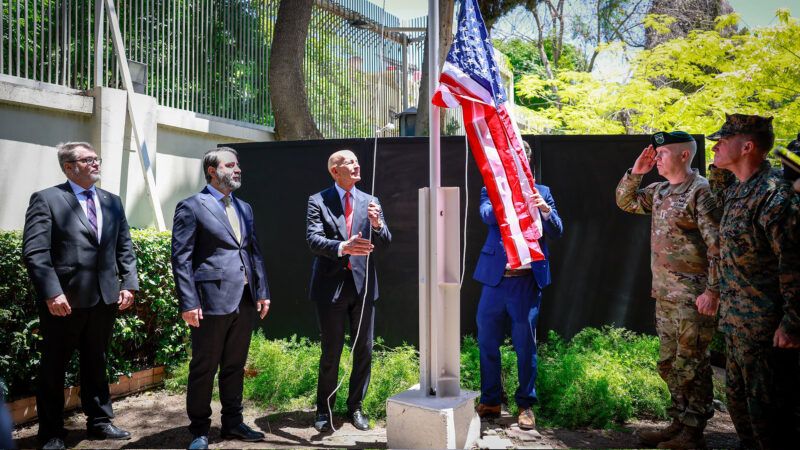Trump's Syrian Outreach Turns an Enemy Into a Friend
Hawks in Washington often make it sound hard to end conflicts with other countries, but the United States and Syria are fixing relations overnight.

Six months ago, U.S.-Syrian enmity seemed locked in for good. Congress was set to renew the Caesar Civilian Protection Act, a set of economic sanctions designed to weaken the government of Bashar al-Assad by preventing postwar reconstruction. And it was only the latest in a set of economic sanctions imposed in 1979, when the U.S. State Department declared Syria a state sponsor of terrorism.
Even the revolution that overthrew Assad in December 2024 did not seem to change the trajectory. As rebels led by Ahmad al-Sharaa, then nicknamed Abu Mohammad al-Golani, advanced on Damascus, the Biden administration insisted that Golani and his men were also terrorists. Congress went ahead with the Caesar Act renewal, and hawkish factions in Washington prepared to put impossible conditions on sanctions relief.
This week, however, the Trump administration seems to have let bygones be bygones. On Friday, the U.S. Department of the Treasury issued a three-page waiver lifting almost all economic sanctions on Syria unconditionally. On Wednesday, an American flag flew over Damascus for the first time in a decade as the Syrian government handed back the old U.S. ambassador's residence to Thomas Barrack, who serves as both U.S. ambassador to Turkey and special envoy to Syria.
Barrack said that President Donald Trump would soon be taking Syria off of the terrorism sponsors list, and claimed that the long-running Syrian-Israeli conflict is a "solvable problem," Reuters reported. "America's intent and the president's vision is that we have to give this young government a chance by not interfering, not demanding, by not giving conditions, by not imposing our culture on your culture," Barrack told the crowd at the residence.
Later on his trip, Barrack followed up on the symbolism by signing off on a huge concrete investment: a $7 billion deal for a consortium of American, Turkish, and Qatari companies to build up Syrian electrical infrastructure. "Syria is OPEN FOR BUSINESS," Barrack declared on X. "Commerce not chaos!"
It was the same tone Trump himself struck in Saudi Arabia earlier this month, where he denounced "so-called nation builders" who tried to impose their visions by force, bragged that "some of the closest friends of the United States of America are nations we fought wars against in generations past," and shook hands with Sharaa himself.
Of course, a waiver isn't a permanent end to sanctions. The sanctions imposed by Congress have to be lifted by Congress. Earlier this month, Secretary of State Marco Rubio testified to the Senate Foreign Relations Committee that it should do exactly that.
The administration could have taken a different approach. Sharaa had fought for Al Qaeda in the past, and Syria still has active territorial disputes with Israel, which captured the Golan Heights in a 1967 war and seized additional land after Assad fell. Some figures in the administration wanted to slow-roll sanctions relief as a way to keep the new Syrian government on its toes. But Rubio argued to Congress that keeping post-revolutionary Syria economically isolated could cause dangerous instability.
By lifting almost all sanctions at once, the Trump administration demonstrated another foreign policy principle: You can just do things. Despite the bureaucratic tangle of sanctions, which some officials hinted would be a complicated process to undo, Trump simply waived them all with a short, simple declaration. And unlike the former Biden administration, which often complained that its hands were tied by hawkish Senate Democrats on foreign policy, Trump doesn't seem to be paying any political price for his outreach to Syria.
A bigger test will be whether Trump can pull off the same maneuver with Iran, whose nuclear program he is currently negotiating to restrict. Sharaa won Syria a fresh start by overthrowing Assad. Iran, on the other hand, has a whole collection of ongoing, high-stakes disagreements with the U.S. And the U.S.-Iranian rivalry—which includes the 1979 embassy takeover and Iranian intervention in Iraq—has always been more emotionally charged than any U.S.-Syrian rivalry.
Still, many of the same factors that led to "commerce not chaos" with Syria are aligned in favor of a deal with Iran. The Arab states now investing in Syria also want to do business with Iran without fear of U.S. sanctions, and have been reportedly lobbying Trump to deescalate that conflict. Trump himself seems pretty confident that a deal is around the corner—confident enough that he warned Israel not to attack Iran in the meantime.
"I think we're going to see something very sensible," he told reporters at the White House on Wednesday. "That could change at any moment. It could change with a phone call. But right now, I think they want to make a deal, and if we make a deal, it would save a lot of lives."


Show Comments (25)